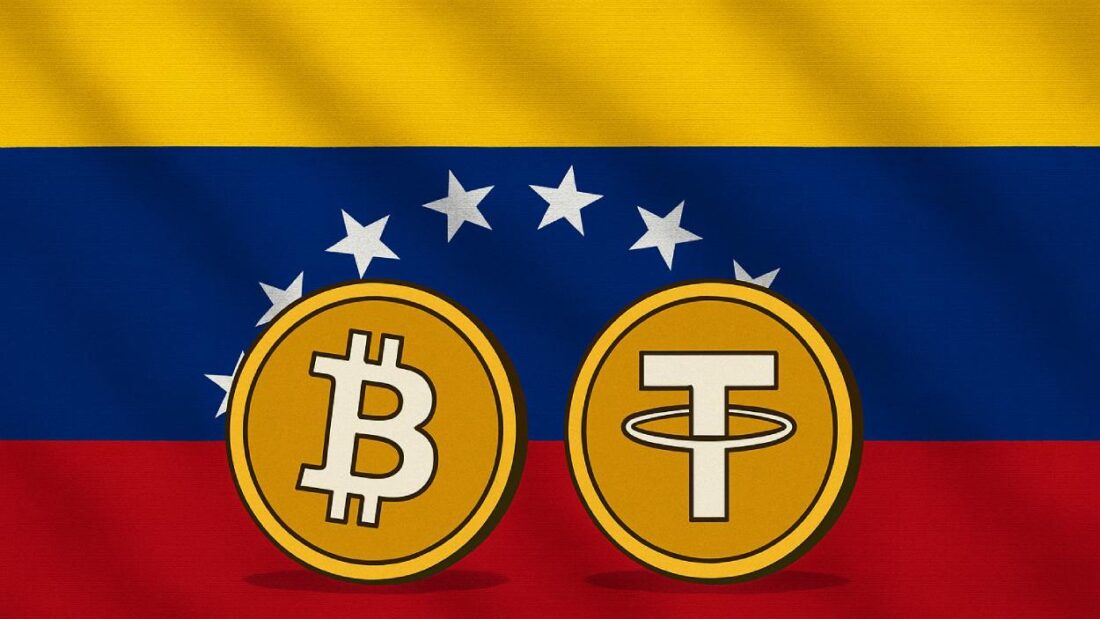Venezuela is moving to integrate Bitcoin and stablecoins into its banking system, allowing citizens to access crypto services directly through their bank accounts.
Key Takeaways
- Conexus, handling 40% of Venezuela’s electronic transfers, is spearheading a project to integrate crypto with the national banking system.
- The system will support Bitcoin and stablecoin (like USDT) custody, transfers, and fiat conversions through regulated banks.
- Venezuelans already rely heavily on stablecoins to cope with inflation and a devalued bolivar.
- The rollout is expected by December 2025, positioning Venezuela as a pioneer in national crypto banking integration.
What Happened?
Venezuela’s major payment firm Conexus is developing a blockchain-based infrastructure that will bring Bitcoin and stablecoins into the country’s traditional banking system. This move aims to give citizens regulated and safer access to crypto services, replacing the reliance on informal and unregulated apps.
JUST IN: 🇻🇪 Venezuela to add Bitcoin to its national banking network, letting banks handle $BTC for customers across the country. pic.twitter.com/xTsuSqr8YB
— Whale Insider (@WhaleInsider) October 31, 2025
Venezuela’s Banking System Prepares for Crypto Integration
Conexus, one of the most influential players in Venezuela’s financial ecosystem, is leading efforts to connect banks directly to digital assets. The company, which processes around 40% of all electronic transfers in Venezuela, is building a system that will let banks provide regulated crypto services.
This means Venezuelans will soon be able to:
- Deposit Bitcoin and stablecoins like USDT through their bank accounts.
- Transfer digital assets between banks.
- Convert between bolívars and digital currencies with official oversight.
These services are designed to operate within the existing financial system, eliminating the need for third-party crypto platforms and peer-to-peer exchanges.
Stablecoins Offer Lifeline Amid Economic Crisis
Years of hyperinflation have driven Venezuelans to find more stable ways to store their money. Stablecoins, especially USDT (Tether), have become a go-to financial tool. Unlike the bolívar, these digital assets hold their value against the US dollar, offering a reliable alternative for daily transactions.
Conexus President Rodolfo Gasparri emphasized this point, stating that stablecoins have evolved from speculative tools into practical financial instruments. He added that the banking system must adapt to reflect how people are actually managing their money.
With regulated crypto custody and conversion services, citizens will be able to use digital money in a safer, more transparent environment than the current patchwork of unregulated apps.
December 2025: A Pivotal Moment for Crypto Banking
The platform’s launch is expected by December 2025, though rapid progress suggests an earlier rollout might be possible. When operational, it could make Venezuela one of the first countries in the world to fully integrate cryptocurrencies into national banking.
This development could dramatically reshape Venezuela’s financial system by:
- Modernizing digital payments through blockchain technology.
- Expanding financial access in a country where many are unbanked.
- Improving transparency and compliance in crypto transactions.
According to Gasparri, the goal is to build trust and encourage wider adoption by giving users the benefits of bank-level security and government regulation.
A Model for Other Economies in Crisis?
The move is drawing attention from analysts who see Venezuela’s approach as a potential blueprint for other inflation-hit countries. If the project succeeds, it could show how blockchain technology and regulated crypto services can work within national financial structures.
By creating a legal bridge between fiat and digital money, Venezuela may also reduce reliance on cash-based systems and promote a more resilient, inclusive economy.
CoinLaw’s Takeaway
I find Venezuela’s crypto banking move incredibly bold, but also very necessary. In my experience following crypto adoption in emerging economies, the biggest hurdle is always trust. By putting digital assets under the watch of national banks, Venezuela is telling its people, “You can trust this.” And that’s huge. I’ve seen so many countries toy with crypto at the edges, but few have taken this leap. If it works, it won’t just change Venezuela’s financial system, it might light the way for others.


































































